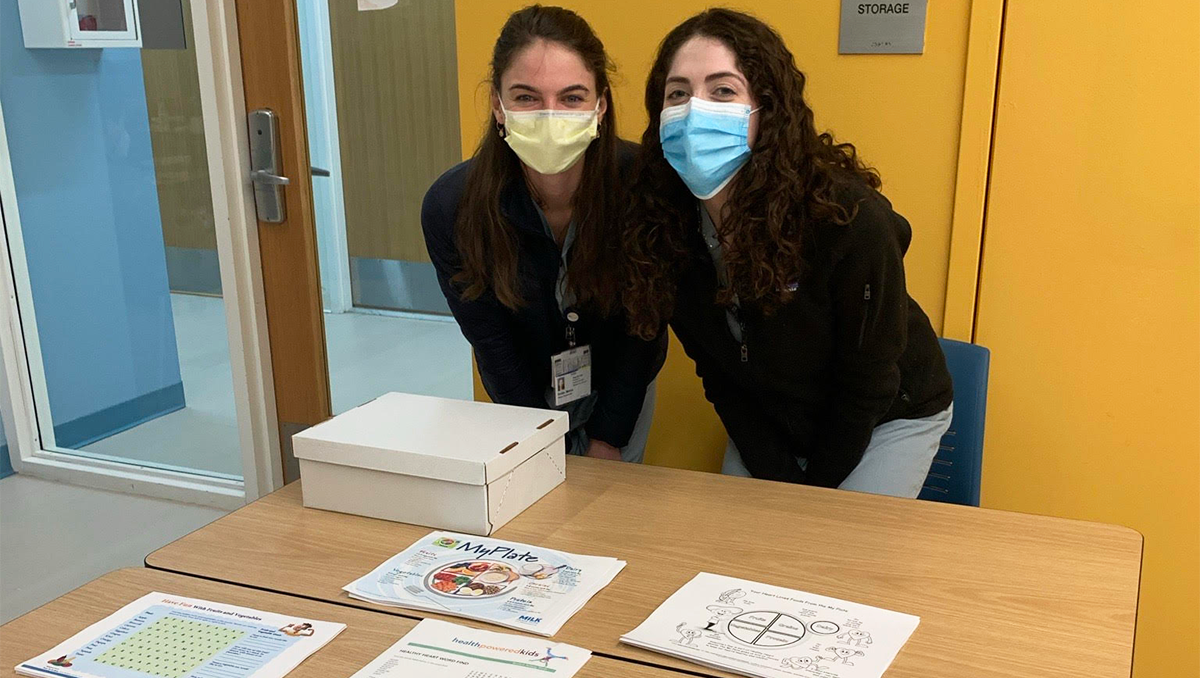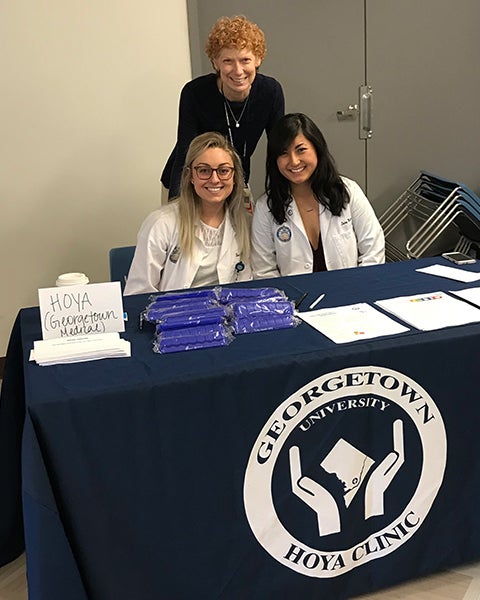Virtual Classes Give Medical Students Opportunity to Teach, Learn From HOYA Clinic Community

Posted in GUMC Stories | Tagged community outreach, HOYA Clinic, School of Medicine, service to others
(May 13, 2021) — For several years, Georgetown medical students have led health and wellness classes for clients at the HOYA Clinic, covering topics including exercise and preventative health. The classes resumed in a virtual setting in October with N Street Village, an organization serving women with low income and those experiencing homelessness.
In addition to sharing information about important topics, the classes give medical students a way to build relationships in an environment that’s more casual than clinical.
“We try to get past the white coat,” said Eileen Moore, MD, associate professor of medicine and family medicine and medical director of the HOYA Clinic. “The white coat is very important in many ways, but sometimes it’s just that human to human, eye to eye connection that really makes the biggest difference. And that’s what we’re striving for.”
Assessing Needs and Receiving Feedback
The classes grew organically from the desire to empower the women at N Street Village with the information and resources they need to live healthy lives. “We reached out to the community to do a little bit of an assessment, saying, ‘How else can we be helpful? What else can we bring?” Moore said. “And we ended up in this wonderful partnership.”

At the beginning of each quarter, students ask what topics the women would like them to cover in class. As education coordinator for the HOYA Clinic, Lizzie Torrez (M’24) works with N Street Village to organize the classes in collaboration with subcommittee leaders. Focusing on the specific topic areas of women’s health, wellness, and health promotions and preventative health, the subcommittee leaders work directly with students to plan the classes.
After receiving the topics of interest from N Street Village, the education team decides what to cover, creates a schedule and shares it with the medical students, who sign up to discuss specific topics. After each class, the students build upon the feedback they receive. For example, after receiving several questions about hormones in one class, the students decided to focus a separate class on the subject to offer a deeper dive.
The women at N Street Village have appreciated the classes, according to Emily Seiler (M’24), HOYA Clinic education committee wellness leader. “I think the initial and most salient response for a lot of the women is just this sense of gratitude, but more so for the genuine human connection that we have an opportunity to build with them during this really unsure time,” she said.
Moreover, the feedback from the students leading the classes has been consistently positive. “Every single time, volunteers come back and say, ‘I’m so glad I did this, this was really rewarding or wonderful to build connections with people,’” Seiler said.
After leading a class on mental health, Nina Kishore (M’24), HOYA Clinic education committee health promotions leader, agreed. “For me, it is a real joy to meet the women in the class and learn more about their lives,” she said. “Teaching virtually comes with its own new challenges, but the regular weekly attendance, participation and thoughtful questions from the women attending our classes at N Street Village has been so rewarding.”
Listening and Learning
The same group of about six to 10 women participate in each virtual class at N Street Village. “The first meeting that I was able to go to, I showed up to the Zoom and everyone was setting up in the room and creating a circle around the computer screen,” Seiler said. “Even over Zoom, I felt like I was part of the community. So I think that was really special, that they welcomed us in like that.”
The classes give the women a chance to share their stories in a safe environment. During Kishore’s talk, the women recounted some of their experiences during the pandemic. “Many of the women spoke about the stressful circumstances of the past year with the COVID pandemic and the challenges of being separated from their friends and family members,” she said. “Our conversation had moments of humor, shared reflection, and understanding. I believe that we all walked away having learned a little more about our health and also about how we can support one another, even in challenging times.”
Having the chance to listen to and learn from the women benefits the medical students as well. “I think that really we learn as much from them as we teach them, if not more,” Moore said. “We benefit just as much as the women we care for and teach there too. And it’s a beautiful partnership in that regard.”
Providing Accessible Information in a Sensitive Way
The medical students strive to provide virtual class participants with accurate and accessible information, and work with faculty members to address sensitive topics. “We really want all of the lesson plans to be top of the line and something that would be at the same level of quality if not better as the medical students would get,” Torrez said.
In preparation for a class on sexually transmitted infections, Jasmine Rice (M’24), women’s health subcommittee leader, met with Susan Cheng, EdLD, MPP, senior associate dean for diversity, equity and inclusion and deputy Title IX coordinator for the School of Medicine, and Val Tovar, associate director of sexual assault response and prevention for diversity and inclusion for Health Education Services at Georgetown. Rice also identified and shared information about local organizations near N Street Village that offer STI testing, safe-sex resources and harm reduction counseling.
Rice’s class was part of a curriculum she developed that also covered body positivity and preventative health screenings. “The women at N Street Village amazed me from our first session,” she said. “Every session, the women come ready to speak and ask questions. Not once have I had an experience where I had to probe them for a response. There is always one brave woman ready to answer, which signals everyone else to share as well.
“In the future I would not change anything,” Rice added. “I am so grateful that women who have never met me in person feel a spirit of connectivity with me. They are willing to open up to me and their fellow N Street Women about their trials, but more importantly, their testimonies about how they have overcome challenges they have been through. I learn so much more from the women than I could ever teach them.”
Working Together
Programs like the virtual classes lay the groundwork for physicians and patients to collaborate on ways to achieve shared goals. Moore recalled meeting a woman while doing blood pressure screenings at a health fair who felt overwhelmed by the advice she’d received. Others had talked to her about her blood pressure, blood sugar and the need to exercise, but she didn’t feel safe walking in her neighborhood and didn’t want to take pills to lower her blood pressure. “We talked for 35 to 40 minutes about what was possible for her,” Moore said. “And we got to the point where she had an action plan for each of her health issues that she was working on.”
Together, they decided that if the patient lost 10 pounds, they would revisit whether she needed to take blood pressure medication. “It was just so lovely,” Moore said. “It took a lot longer, of course, because of materials available and all, but she was able to do it the way she wanted to do it and the way she felt comfortable. And I just thought, oh my gosh, I wish all of medicine was like that.”
Learning how to collaborate with patients on their care, rather than simply write a prescription, is valuable experience students can build on. “I just applaud the students, because doing that kind of work is what’s most needed,” Moore said. “It’s not that a person in an under-resourced situation can’t do something like anybody else. It’s just the mechanisms are going to be different. And you just have to take the time to really reach out and sort through and figure out what that mechanism looks like.”
For more information on the HOYA Clinic classes at the N Street Village, contact Lizzie Torrez at emt84@georgetown.edu.
Kat Zambon
GUMC Communications
